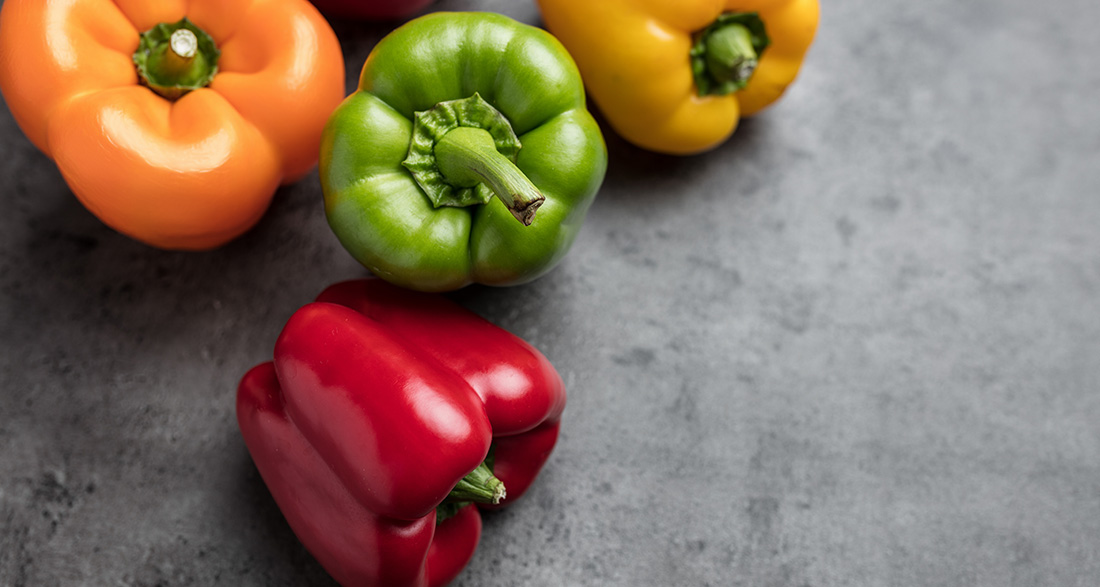We humans love bell peppers, chili peppers, and the like. However, these nightshade plants pose a problem in canine nutrition. The main reason is the presence of solanine, which can cause severe poisoning in dogs. Nevertheless, in well-measured amounts and properly prepared, your dog can eat bell peppers – at least the red ones.
Bell Peppers are Healthy – But Not for Dogs
Bell peppers hold a significant place in human nutrition. They provide essential fiber and minerals and are true vitamin C bombs, surpassing even citrus fruits with 140 milligrams per 100 grams of bell pepper. Abundant in A and B vitamins, bell peppers are also enriched with antioxidants that neutralize free radicals in the body. A true superfood for humans? Yes – but not for your dog. The reason is that bell peppers belong to the nightshade family and contain solanine, which is toxic to dogs. Therefore, dogs should not eat bell peppers, except perhaps in small amounts, ripe, red, and cooked.
Solanine is Toxic to Dogs
Especially green and yellow bell peppers contain solanine. Since solanine is partially broken down during the ripening process, red bell peppers are less toxic than green or yellow ones. Nevertheless, caution is still necessary: Your dog should not eat too much red, raw bell pepper. Boiling makes bell peppers more digestible. While solanine is not destroyed during cooking, it leaches into the cooking water. The highest solanine content is found in the stem of the bell pepper. Before cooking, be sure to remove the stem, all white parts, and the seeds.
Why is Solanine Toxic to Dogs? Solanine irritates the mucous membranes of the gastrointestinal tract, destroys red blood cells, and leads to a suppression of the nervous system. As always, the dose makes the poison, as humans can also suffer from solanine poisoning. However, an 80-kilogram man can tolerate a much higher amount than a two-kilogram Chihuahua.
In general, bell peppers should not be part of your dog’s diet. In exceptional cases, a small amount of cooked red bell pepper may be tolerated. However, closely monitor your dog after consumption. It’s best to ensure that bell peppers don’t come near your dog in the first place.
What to Do If Your Dog Has Eaten Bell Peppers?
If your dog has eaten a piece of bell pepper, it will likely lead to symptoms of poisoning. The main symptoms of solanine poisoning are:
If your dog has consumed larger quantities of bell peppers, consult a veterinarian who can induce vomiting. The time factor is crucial here, as inducing vomiting reduces solanine absorption.
How Much Bell Pepper Can Dogs Eat?
Solanine is slowly metabolized by the body. Therefore, bell peppers should preferably not be fed at all. If your dog accidentally consumes a small piece of red bell pepper, it will usually not lead to severe problems. However, extra caution is advised with green bell peppers. You should keep them completely out of your dog’s reach.
Chili peppers and jalapeños are also not suitable for the dog bowl. They contain capsaicin, responsible for spiciness, and can cause gastrointestinal bleeding and severe difficulty breathing in dogs.
Alternatives to Bell Peppers for Dogs
There are plenty of healthy alternatives for dogs: kohlrabi, carrots, cucumber, and beets provide essential vitamins and minerals and can be fed without worry. With other nightshade plants like potatoes, you should also be cautious and feed them peeled and cooked. Unripe tomatoes and eggplants, like green bell peppers, should not end up in your dog’s bowl. Learn more about supplements in our magazine article.
Conclusion: Can Dogs Eat Bell Peppers?
Dogs should preferably not eat bell peppers. In very small quantities and with plenty of time in between, they can usually tolerate the consumption of red bell peppers unharmed, but bell peppers should not be intentionally fed. Green bell peppers are completely off-limits.


